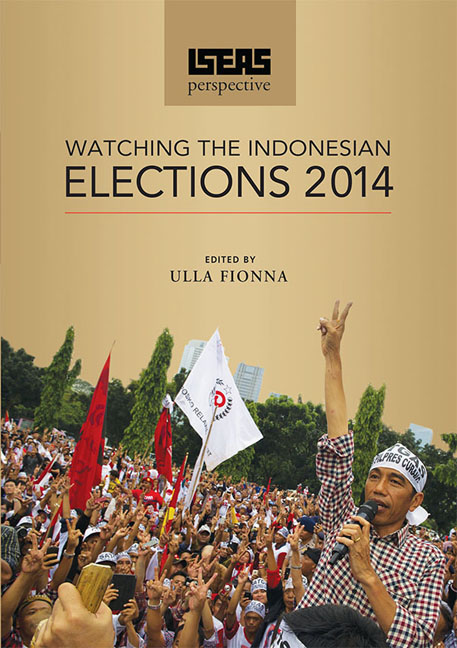Book contents
- Frontmatter
- Contents
- Foreword
- Introduction
- 1 The Gubernatorial Race in Jakarta: Background and Implications
- 2 Indonesian Parties Struggle for Electability
- 3 Who Will Be Indonesian President in 2014?
- 4 Indonesian Presidential Election Forcing Rejuvenation of Parties
- 5 Resisting Democracy: Front Pembela Islam and Indonesia's 2014 Elections
- 6 Getting to Know the Contestants of the 2014 Indonesian Parliamentary Elections
- 7 A Snapshot of the Campaigning in Indonesia's 2014 Legislative Elections
- 8 Unpacking the Results of the 2014 Indonesian Legislative Elections
- 9 Indonesia's 2014 Legislative Elections: The Dilemmas of “Elektabilitas” Politics
- 10 The Islamic Factor in the 2014 Indonesian Elections
- 11 Vote-buying in Indonesia's 2014 Elections: The Other Side of the Coin
- 12 Gap Narrows Between Candidates in Indonesian Presidential Elections
- 13 Analysing the Economic Platforms in the Indonesian Presidential Election
- 14 Indonesian Islamic Parties After the 2014 Elections: Divided and Self-Centred
- 15 Safeguarding Indonesia's Pluralism: An Essential Task for Joko Widodo
- 16 Jokowi's Key Economic Challenge: Improving Fiscal Policy for Equitable Growth
- 17 Crossing the River While Avoiding the Stones: Jokowi's Run-up to the Presidency
- 18 Post-elections Indonesia: Towards a Crisis of Government?
- Epilogue: Jokowi's First Months: Compromise Cabinet, Subsidy Cuts, and Corrupt Coalition
13 - Analysing the Economic Platforms in the Indonesian Presidential Election
Published online by Cambridge University Press: 29 July 2017
- Frontmatter
- Contents
- Foreword
- Introduction
- 1 The Gubernatorial Race in Jakarta: Background and Implications
- 2 Indonesian Parties Struggle for Electability
- 3 Who Will Be Indonesian President in 2014?
- 4 Indonesian Presidential Election Forcing Rejuvenation of Parties
- 5 Resisting Democracy: Front Pembela Islam and Indonesia's 2014 Elections
- 6 Getting to Know the Contestants of the 2014 Indonesian Parliamentary Elections
- 7 A Snapshot of the Campaigning in Indonesia's 2014 Legislative Elections
- 8 Unpacking the Results of the 2014 Indonesian Legislative Elections
- 9 Indonesia's 2014 Legislative Elections: The Dilemmas of “Elektabilitas” Politics
- 10 The Islamic Factor in the 2014 Indonesian Elections
- 11 Vote-buying in Indonesia's 2014 Elections: The Other Side of the Coin
- 12 Gap Narrows Between Candidates in Indonesian Presidential Elections
- 13 Analysing the Economic Platforms in the Indonesian Presidential Election
- 14 Indonesian Islamic Parties After the 2014 Elections: Divided and Self-Centred
- 15 Safeguarding Indonesia's Pluralism: An Essential Task for Joko Widodo
- 16 Jokowi's Key Economic Challenge: Improving Fiscal Policy for Equitable Growth
- 17 Crossing the River While Avoiding the Stones: Jokowi's Run-up to the Presidency
- 18 Post-elections Indonesia: Towards a Crisis of Government?
- Epilogue: Jokowi's First Months: Compromise Cabinet, Subsidy Cuts, and Corrupt Coalition
Summary
INTRODUCTION
The two sides competing in the Indonesian Presidential election to be held on 9 July — Prabowo Subianto and his Vice Presidential candidate Hatta Rajasa against Joko Widodo (Jokowi) and his running mate Jusuf Kalla — have both submitted their coalition's platforms to the General Elections Commission (KPU).
Whoever becomes president will face the same challenges that outgoing President Susilo Bambang Yudhoyono's (SBY) has been trying to address through his economic policies. These challenges are reflected in the targets set by the 2014 state budget, which are: (i) to reduce poverty to 9.0–10.5 per cent (currently 11.47 per cent); (ii) to create new jobs (1 per cent economic growth can generate 200,000 new jobs); (iii) to decrease unemployment to 5.7–5.9 per cent (currently 6.25 per cent); and (iv) to decrease income inequality (the Gini coefficient is currently 0.413).
Prabowo's economic strategy is to expand fiscal spending and invest in a range of new development projects with the goal of increasing economic growth to around 7–10 per cent in the first presidential term (2014–19). At the same time, he aims to reduce the Gini ratio to about 0.31. On the other hand, Jokowi proposes to reduce Indonesia's poverty rate to about 5–6 per cent by 2019 by providing free education and skills improvement for the poor.
This article evaluates Prabowo's and Jokowi's proposals in four economic sectors, namely agriculture, energy, industry and labour, which are important for achieving food security, energy security, and enhancing national competitiveness.
GIVING PROMISES
Prabowo proposes a number of new public spending initiatives in his economic platform and plans to increase the public spending-to-GDP-ratio to 19 per cent of GDP by 2019. (The ratio of government spending to GDP during the SBY administration was about 9 per cent.) This means that government spending will increase dramatically under Prabowo's administration, as indicated by his specific proposals. For instance, he plans to increase public investment in basic infrastructure by Rp1,400 trillion (US$98 billion) between 2015 and 2019. His proposal would allocate funds to all public elementary and secondary schools as well as Islamic schools (pesantrens or madrasahs) in Indonesia, amounting to Rp150 million (US$12,900) per school.
- Type
- Chapter
- Information
- ISEAS PerspectiveWatching the Indonesian Elections 2014, pp. 114 - 122Publisher: ISEAS–Yusof Ishak InstitutePrint publication year: 2015



